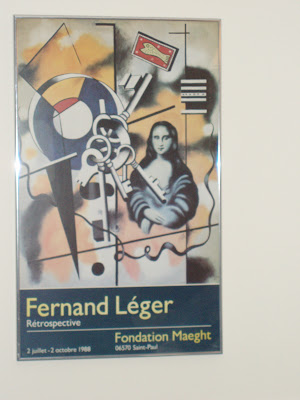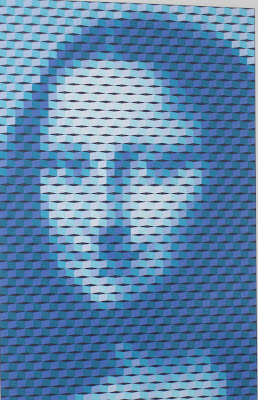








From the anonymous copy owned by the Prado through the Mona Lisa like Raphael, Picasso, Leger, etc. Are these, too, cold and lonely works of art?
Word: skeuomorph [SKYOO-oh-morf] a decoration that takes its form from the nature of the material used or the method used to make it. The word is also used for an object that copies the design of a similar object made in another material-- a plastic Adirondack chair would be a skeuomorph. From Greek words meaning 'form' and 'vessel.'
So ANYTHING copied in plastic is a skeuomorph. Like those vinyl boots that have seam-marks molded right into them because they are copies of leather ones. Those plastic Japanese laundry baskets with the marks of woven reeds molded into them. Len suggests a veggie burger: it looks like meat, it's really not. And Krab made from fish paste and colored to look like crab legs.
I wonder about "takes its form from the nature of the material used" -- would this include a ram's horn made into a sound producing device; that is, a shofar? Chain-saw sculpture made out of a tree? Chia pets? A coffee table made of a tree root?
The poor Greeks: they didn't have plastic, I guess they were thinking of gourds made into drinking vessels, or ceramic drinking vessels made to look like gourd vessels. (If the word really does date back to the Greeks, rather than having been made up from Greek roots more recently.)
I'm afraid actually using this wonderful word would be wildly ostentatious. Too bad.
 Shakespeare's lifetime was full of events as compelling as those in his plays. Any author, however, claims at his peril that he knows exactly how reality and Shakespeare's fictions line up. In Will in the World: How Shakespeare became Shakespeare author Stephen Greenblatt presents the real events in a most fascinating way. Then he quite frankly speculates on how Shakespeare reflected them in his poetry and plays.
Shakespeare's lifetime was full of events as compelling as those in his plays. Any author, however, claims at his peril that he knows exactly how reality and Shakespeare's fictions line up. In Will in the World: How Shakespeare became Shakespeare author Stephen Greenblatt presents the real events in a most fascinating way. Then he quite frankly speculates on how Shakespeare reflected them in his poetry and plays. I love the way Shakespeare's early life is connected, speculatively, to his career. For example, I enjoyed the discussion of whether Shakespeare had a history as a deer poacher at Sir Thomas Lucy's deer park at Charlecote near Stratford (shown in a photo from our visit in 2000). Then I enjoyed the speculation of what this did to Shakespeare: "Throughout Shakespeare's career as a playwright he was a brilliant poacher -- deftly entering into territory marked out by others, taking for himself what he wanted, and walking away with his prize under the keeper's nose." (Will in the World, p. 152)
I love the way Shakespeare's early life is connected, speculatively, to his career. For example, I enjoyed the discussion of whether Shakespeare had a history as a deer poacher at Sir Thomas Lucy's deer park at Charlecote near Stratford (shown in a photo from our visit in 2000). Then I enjoyed the speculation of what this did to Shakespeare: "Throughout Shakespeare's career as a playwright he was a brilliant poacher -- deftly entering into territory marked out by others, taking for himself what he wanted, and walking away with his prize under the keeper's nose." (Will in the World, p. 152)Macbeth leaves the weird sisters unpunished but manages to implicate them in a monstrous threat to the fabric of civilized life. The genius of the play is bound up with this power of implication, by means of which the audience can never quite be done with them, for they are most suggestively present when they cannot be seen, when they are absorbed into the ordinary relations of everyday life. If you are worried about losing your manhood and are afraid of the power of women, it is not enough to look to the bearded hags on the heath, look to your wife. If you are worried about temptation, fear your own dreams. If you are anxious about your future, scrutinize your best friends. And if you fear spiritual desolation, turn your eyes on the contents not of the hideous cauldron but of your skull: 'O, full of scorpions is my mind, dear wife!' (3.2.37)" (Will in the World, p. 355)





 My antique Mona Lisa postcards almost all date from the time of the famous theft of the painting from the Louvre. The one above is labeled "La Joconde" and notes that the painting disappeared from the Louvre on August 21, 1911. The next one adds the recovery date: December 12, 1913, in Florence.
My antique Mona Lisa postcards almost all date from the time of the famous theft of the painting from the Louvre. The one above is labeled "La Joconde" and notes that the painting disappeared from the Louvre on August 21, 1911. The next one adds the recovery date: December 12, 1913, in Florence. During the year and a half that the painting was missing, a number of satirical postcards played on the disappearance. The next one "prays" to St. Anthony of Padua. In the blank spot was an invisible ink Mona Lisa that apparently appeared when heated (on the back, is some soot from a candle). On the actual card, you can see a very, very faint image of her face.
During the year and a half that the painting was missing, a number of satirical postcards played on the disappearance. The next one "prays" to St. Anthony of Padua. In the blank spot was an invisible ink Mona Lisa that apparently appeared when heated (on the back, is some soot from a candle). On the actual card, you can see a very, very faint image of her face. Two more satiric cards with silly verses. The second one promises "I will come back when chickens have teeth."
Two more satiric cards with silly verses. The second one promises "I will come back when chickens have teeth."
 More to come...
More to come...